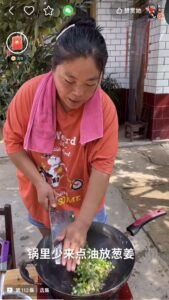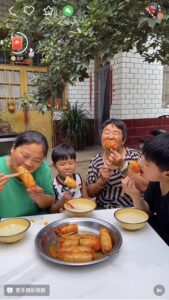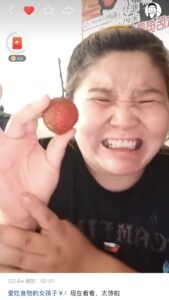“Hello brothers and sisters, today making xiaolongbao. First prepare the dough: put 5 grams of yeast into 500 grams of flour.” Nongcunhuijie (Village Sister Hui) uploads videos to Kwai demonstrating how to make various kinds of food with loud, concise instructions. Her tuwei videos often begin with an orchestrated subplot, either Huijie interacting with her sons or husband as a lead-in to the dish featured later in the video: “Kid, time to go to school!  What do you want to eat for lunch? Mom will make it for you.” Her videos would fall under the heading of tuwei: the slight awkwardness, the rural setting, her earthiness and energy. These elements, along with Huijie’s big family and positive attitude, have attracted almost 14 million followers, which raises questions about the complicated dynamics between China’s rural populations and Chinese officialdom.
What do you want to eat for lunch? Mom will make it for you.” Her videos would fall under the heading of tuwei: the slight awkwardness, the rural setting, her earthiness and energy. These elements, along with Huijie’s big family and positive attitude, have attracted almost 14 million followers, which raises questions about the complicated dynamics between China’s rural populations and Chinese officialdom.
The term “tuwei,” literally “rural taste,” is used to describe what is earthy, uncouth, unfashionable and lowbrow. Tuwei culture is a recent cultural trend emerging from the Chinese short-video sharing platform Kwai, whose users are predominantly rural, and make videos largely devoted to sharing their everyday lives. But a foreign creator’s content can also be categorized as tuwei if it conforms to the characteristics of the genre. Tuwei’s first transgression is to scramble distinctions between city and rural: to begin with, though its content focuses on the rural, urban residents are the significant a part of tuwei culture’s audience—rural viewership is only 28.2% of all netizens—meaning that urban viewers have some abiding fascination with these spectacles of rural life.
Tuwei culture arose in the midst of social, economic, and geographic transitions in China. The Chinese economic reforms begun in 1978 resulted in immense social changes. China shifted from state ownership and central planning to a “dual-track” economy, leading to a great decrease in poverty along with increases in both average income and income inequality. On the one hand, the movement toward a mixed economy gives the population far more personal freedom. People were able to choose their jobs and where they work. They began to develop more individualized lifestyles, in contrast to the stereotype of faceless and obedient automatons in Mao suits. On the other hand, these transformations drastically heightened the distinctions between rural and urban life: the countryside was crude and backward, and urban life, by comparison, sophisticated and cultured.
Which perhaps accounts for why food is a recurring theme in tuwei videos. It must be emphasized that cultural production has always been a political not a private matter in China, where the media are state-regulated, though video sharing platforms are less regulated than the newspapers. China’s top leader Xi Jinping recently declared war on food waste. CCTV and other state media sources called out binge-eating live streamers for promoting excessive eating, and video sharing platforms immediately implemented corresponding regulations, such as prohibiting consumption of large amounts of food and drinks on camera.
Tuwei culture raises important questions both about rural and urban conditions and about whether the new video-sharing landscape makes resistance against state cultural dominance possible. This relatively unregulated landscape allows tuwei creators to evade the conventional state aesthetics, carving out spaces of personal freedom, even while always in danger of being quashed. At the same time, tuwei culture is utilized by citizens to construct a curated public persona, often at the cost of their dignity, to achieve fame and financial independence.
The Local
Huijie comes from Haitong Village in Puyang County, Henan Province, and according to her bio, she is “an ordinary country woman” and “films only to document life.” She speaks Mandarin with a Henan accent; she wears an apron and oversleeves over her winter coat; she’s chubby, and her skin is tanned to a dark red. In her early videos from late 2017, she gave step-by-step tutorials on Chinese dishes: how to fry conghuabing (scallion pancake) and steam baozi. The backdrop was rustic—behind her were stacks of hay, and she cooked on a hand-built wood-fire stove. Sometimes she’d pick vegetables from her own fields as ingredients for her food tutorial: “Look at our green beans, just enough for one meal.” All of which added authenticity: she’s a virtual study in the counter-urban. After she’s done cooking, she’s also frequently joined by her two sons and nephew, who sit packed together in the tight space between the stove and the haystacks, gobbling the food Huijie has just cooked.
In comparison, a stereotypical mainstream zhubo (livestreamer) looks like this: she puts on heavy makeup, fixes her hair, wears sexy clothes. She has a professional livestreaming setup including PC, camera, lighting and microphone; the backdrop is a pink bedroom, with stuffed animals arranged on her bed. She’s pretty and coquettish; she sings and chats with the men in her livestream. Huijie has taken a completely different—and far more original—route than the zhubos before her.
As Huijie’s account grew in popularity, she started featuring western foods like pizza and egg tarts in her tutorials. Western foods are generally considered classier than domestic Chinese foods, no doubt because they’re less accessible, especially outside the cities. In this spirit, having a countertop oven, an uncommon kitchen appliance for traditional Chinese cooking and often considered “western,” is an indication of Huijie’s success. Nevertheless, her earthiness remains intact. In her most recent videos, she often cooks in the concrete yard of her country house, whose door is hung with a few dried gourds. She has upgraded her stove to an induction cooker set up on a low table, but the countertop oven is still visible on top of a chair nearby.
Before her Kwai career, Huijie was farming in the area around her home while her husband worked as an internal migrant laborer in Tianjin to support the family. After 16 years, he came back to the countryside to recuperate from chronic stomach disease, due to overwork and an irregular diet. China’s hukou (household registration) system, implemented since the Mao era’s (1958) centrally planned economy, divides the population into non-agricultural and agricultural, the former economically and socially superior to the latter. While it could never fully control population movements, hukou greatly limited people’s geographical and social mobility. One motive was preventing influxes of rural population into the cities. The emergence of large numbers of migrant workers with jobs in the city but whose homes are elsewhere demonstrates its effectiveness: Huijie’s husband and other rural residents are allowed to work in the city but face multiple obstacles to settling down there, for instance not being able to register their children for school.
 Kwai provided Huijie a platform that liberated her from the geographical constraints of the hukou system, along with an unconventional method of earning money to support her family. By diligently conducting livestreams, she’s cultivated a large fan base, and earned considerable income from it. Her revenue comes from digital gifts (dashang) from her followers along with selling products from her livestream room. During the shows, she chats with her audience and connects virtually (lianmai) with merchants. She celebrates people who send her expensive digital gifts and enthusiastically encourages her viewers to follow those merchants. Her identity as a tuwei zhubo challenges the stereotype of the glamorous zhubo that dominates other mainstream livestream platforms, as does her location in the countryside, and the adherence to a tuwei aesthetic, which is is earthy and abject, often described as “vulgar” and “boring.” Its viewers seem to derive satisfaction from mockery.
Kwai provided Huijie a platform that liberated her from the geographical constraints of the hukou system, along with an unconventional method of earning money to support her family. By diligently conducting livestreams, she’s cultivated a large fan base, and earned considerable income from it. Her revenue comes from digital gifts (dashang) from her followers along with selling products from her livestream room. During the shows, she chats with her audience and connects virtually (lianmai) with merchants. She celebrates people who send her expensive digital gifts and enthusiastically encourages her viewers to follow those merchants. Her identity as a tuwei zhubo challenges the stereotype of the glamorous zhubo that dominates other mainstream livestream platforms, as does her location in the countryside, and the adherence to a tuwei aesthetic, which is is earthy and abject, often described as “vulgar” and “boring.” Its viewers seem to derive satisfaction from mockery.
From a national perspective, Huijie is a new breed of internet mogul, responding to the mass entrepreneurship and innovation campaign put forward by Premier Li Keqiang, and viewed as “a new engine for China’s economic growth” since it was proposed at the 2014 Summer Davos in Tianjin. Lately Huijie has started wearing a diamond ring, jade bracelet, and other jewelry. She’s rumored to have purchased several apartments in Zhengzhou for her sons. She’s become the main source of income for her family, breaking with the stereotype that “man takes care of the money, woman takes care of the home” (nanzhuwai, nüzhunei)—her husband is now the man behind the cameras. Should we view her success on Kwai as a form of virtual resistance to the official restrictions on mobility through hukou and the lack of work opportunities in rural China? After all, this is the “counterattack” (nixi) of the grassroots against their fated underprivilege.
At the same time, she provides “positive energy” (zhengnengliang), in the language of officialdom. Admittedly, zhengnengliang is not a necessary component of tuwei culture, whose overall mission is to provoke and to disgust. Some might say this virtual resistance is trivial, because it’s individually based and because it allows vast class differences to continue to exist. Ultimately it submits to the state’s cynical solution to a stagnant state-controlled economy. At the same time, individual resistance creates opportunities for future political intervention. Perhaps tuewei will end up being an insignificant cultural gesture, yet given the very real constraints on cultural expression, it’s also one of the few feasible forms of resistance available right now.
 Like Huijie, Mirende Guolaoshi (Charming Teacher Guo) also gained fame through food videos featuring peculiar and performative eating. In her most viral video, she looks into the camera with dazed eyes, fiddles with the kiwi in her hands and pronounces “mihoutao (kiwi)” as “mi-hotel.” “How to eat this thing? This thing. Peel it. Very sweet. I’m going to peel it and pause the video.” –the kiwi is peeled. “Let me taste it. To see if it tastes good, if it’s sweet.” She pretends coyly to take a bite – “Ah, it’s so—didn’t eat it.” She holds the kiwi closer to the camera, squeezes out a smile and unexpectedly swallows the entire kiwi. Her entire face wrinkles; she screams painfully and ends the video.
Like Huijie, Mirende Guolaoshi (Charming Teacher Guo) also gained fame through food videos featuring peculiar and performative eating. In her most viral video, she looks into the camera with dazed eyes, fiddles with the kiwi in her hands and pronounces “mihoutao (kiwi)” as “mi-hotel.” “How to eat this thing? This thing. Peel it. Very sweet. I’m going to peel it and pause the video.” –the kiwi is peeled. “Let me taste it. To see if it tastes good, if it’s sweet.” She pretends coyly to take a bite – “Ah, it’s so—didn’t eat it.” She holds the kiwi closer to the camera, squeezes out a smile and unexpectedly swallows the entire kiwi. Her entire face wrinkles; she screams painfully and ends the video.
Guolaoshi comes from Cangzhou in Hubei Province. Her eating style aside, the things she eats are usually ordinary and widely accessible foods. She films homemade noodles that are fairly unappealing and fried egg made from an off-brand sandwich maker whose products smell like plastic. She complains about cherries being too expensive. She shares random details about the food, letting us know there are no fishbones in a packaged fish snack. Sometimes she records vegetable or fruit merchants, and her awkward interactions with them. She’s so starved for attention that she occasionally swallows pieces of raw pork. The impression is that aside from the videos, hers is a lonely and boring life.
Given Chinese aesthetic norms, Guolaoshi is in no way “charming” (mirende), despite what it says on her Kwai ID. She has a round, not especially attractive face and is overweight— people often mistake her for a middle-aged woman, though she’s only in her twenties. She wears no makeup; her hair is messily clipped and tied. No doubt I respond to her this way because I’m a middle-class college student from Beijing. Growing up, I was educated to behave appropriately, and conform to conventional appearance aesthetics. Guolaoshi belongs to a class that is not my own. Her performance disrupts the urban norms I’ve been habituated to; apparently she intends to make people like me uncomfortable. She doesn’t care much about personal hygiene and isn’t afraid to spell that out for the camera. Holding a peeled banana in one hand, she shows the other hand to the camera: “Sorry, jimei (“sister”). I couldn’t buy a nail clipper. I didn’t cut my nails these days, so they are very dirty, because I also do farm work and stuff. So, leave me alone, don’t detest me for being dirty or dowdy.” She takes a bite of the banana. She farts and burps in her livestream. She’s irascible in zhubo contests with more conventional Kwai creators, and doesn’t hold back from calling them dirty names.
 The rustic and vulgar image she cultivates is in competition with her narcissistic self-admiration. In one video, she waves a bunch of unwashed carrots with the tops still on, and after screaming “huluobo (carrots)” in a barely comprehensible manner accompanied by crazed facial expressions, bite into the carrot proclaiming, “Everyone says that I’m as cute as a small white rabbit, but also very Alpha. My vibe is very Alpha, but also very cute.” “Bahahaha!” she squeals with extreme excitement.
The rustic and vulgar image she cultivates is in competition with her narcissistic self-admiration. In one video, she waves a bunch of unwashed carrots with the tops still on, and after screaming “huluobo (carrots)” in a barely comprehensible manner accompanied by crazed facial expressions, bite into the carrot proclaiming, “Everyone says that I’m as cute as a small white rabbit, but also very Alpha. My vibe is very Alpha, but also very cute.” “Bahahaha!” she squeals with extreme excitement.
Despite some viewer comments about Guolaoshi being “real” for exhibiting so many negative traits, most people criticize her for being low suzhi (quality) and, most importantly, having no sense of shame. Shame culture is a key component of Chinese traditions and morals, dating back to Xia-Shang-Zhou civilization and Confucius. It is endorsed by the Chinese government—state paternalism in matters of behavior continues unabated, despite the recent changes in the economy. In 2006, Hu Jintao, the former general secretary of the Communist Party, developed a set of moral concepts called Eight Honors and Eight Shames. The common view is that if one loses a sense of shame, one loses one’s dignity as a human, and is more unlikely to “become a gentleman with decent morals” (Guo, 2008). Lacking such a sense of shame, Guolaoshi’s “uncivilized” behaviors—farting on camera, calling people names—are in deep conflict with these official virtues.
Staging disagreement with the official standards for livestreaming—dignified manners, respectability and zhengnengliang—can have consequences, both from the public and the state itself. Viewers can report Guolaoshi to Kwai for being vulgar, pornographic or offensive. When these claims are validated, the platform’s private regulations kick in, and Guolaoshi will be sent to “Kwai jail”: her account banned for some period of time. Guolaoshi has developed a repertoire of tactics to navigate the platform rules, for example, registering multiple accounts under similar names, and using homophones for foul language to evade censorship. When the state discovers that a platform like Kwai has failed to eliminate vulgar content, CCTV publishes editorials criticizing such phenomena, sometimes naming the specific zhubo. State regulation is much more severe: official sanctions are publicized, with a list of zhubos who are in violation and are placed on a “blacklist.” These violators will be banned by the livestreaming industry from registering and livestreaming for five years.
Given that Guolaoshi’s undignified videos are designed to transgress the cultural mainstream, perhaps we should regard them as an intrinsically political form of expression. In the context of pervasive state control of everyday life and culture, Kwai does open up space for individual liberty, including the liberty to present oneself as grotesque. However, preserving her financial freedom entails compromise: to keep streaming Guolaoshi must sacrifice elements of her non-compliance: “I will better my words,” she promises. “Sometimes I say things in my livestream room that are…somewhat vulgar. Change myself to be more zhengnengliang…I’m thanking Kwai for giving me a platform to present…” Guolaoshi proclaimed after her ban was lifted. Whether she’s sincere or not is anyone’s guess.
The International
Tuwei culture’s creators are not limited to Chinese nationals residing in rural China. It’s reach extends to another short-video sharing platform known as Douyin. Fulafu, a 25-year-old white man from Russia, has accumulated 9.2 million followers on Douyin. His videos share common tuwei aesthetic elements: pervasive awkwardness, a performative quality, repeated simple arguments. He is rustic (tu) and vulgar (su). However, there is a major difference between him and the two zhubo discussed above: while most creators’ tuwei images are intensified versions of their normal selves, Fulafu’s tuwei is a carefully curated persona, developed after several failed attempts in other directions. His short bio sums up his current image: “Love China! Love hot pot!”
Though Fulafu’s fame isn’t entirely due to hot pot, it’s a recurring theme in his content. It’s no lie that he loves hot pot, a love he showed frequently in his earliest videos. Back then, he spoke fluent Chinese calmly, like an ordinary person. His current videos are a drastic departure. They intentionally emulate the codes of tuwei, making them more accessible and attracting more views, though certainly at the cost of his dignity. These new videos are faster paced and rely on repeated corny background music. The most obvious change is Fulafu’s facial expressions and manner of speaking: he raises his eyebrows, his forehead wrinkles deepen, and his eyes bug out “as if he has hyperthyroidism,” comment many viewers. Part of his shtick is using all kinds of strange and irrelevant ingredients to make hot pot: coconut, cilantro, whipped cream, watermelon… His mission is to show that he’s fluent in Chinese culture, and establish “common points” (gongtongdian) between himself and Chinese people, to cultivate the “Love China” element of his online personality.
Fulafu’s real name is Vlad. He was born in a small Russian city near the border between China and Russia. At age 17, he came to Beijing to study economics and trade at Beijing Language and Culture University, completing his Bachelor’s thesis on “A Survey and Analysis of Beijing’s Imported Wine Market” in 2016, and graduating at the top of his class. Unfortunately this did not guarantee him a decent job.
After graduation he worked at a warehouse of a logistics company. The job was laborious, and he had to commute four hours a day. Tired of the wage slave life, he tried starting his own business, an abaozi shop in Beijing which failed. He next turned to importing wine. In a now deleted Youku video, he introduces “Ciombo” Moscato D’Asti Canelli DOCG of Il Falchetto, a sweet wine from Italy. Here the image is one feigned classiness – he wears a loose black suit jacket paired with a pale-yellow T-shirt on the inside and a watch on his right wrist, and speaks fluent Chinese in a normal manner. His fan jokingly say this was before Fuflafu’s “onset of hyperthyroidism.”
Fulafu had the correct intuition about wine consumption in China, choosing to introduce a sweet wine, aware that most Chinese people dislike wine’s bitterness. It’s often mixed with soda to make it more palatable. Still, the video didn’t get a lot of views. For one thing wine is expensive, more inaccessible, and not much incorporated into the Chinese lifestyle.
In the early days Fulafu didn’t particularly emphasize his foreignness. He seemed like one of those Beijing drifters struggling for a bright future. He wanted to fit in. The problem is that, in China, people are always interested in the particularity of foreigners. Officially, China’s waishi (foreign affairs) system has constructed a highly politicized image of foreigners as the Other, in contrast to the Chinese self; foreigners are portrayed as hopelessly alien and different from Chinese people. Xenophobia and admiration toward foreigners exist simultaneously. Chinese see them as spectacles; they love taking photos with random foreigners. Caucasian models are also prevalent in Chinese advertisements, they’re seen as validating a brand’s international legitimacy. Because of the upsurge of English, many foreigners come to China to work as English teachers, and are often paid more than Chinese teachers of English. To some extent, English fluency matters less than a foreigner’s appearance. Foreigners working in China and whose qualifications are little more than being Western and Caucasian, are known as “white monkeys.” The term is an oxymoron: while being “white” is considered admirable or even superior while “monkey” is derogatory in China, implying the person is a fool.
Fulafu posted a video in December 2018, explaining why he is Chinese at heart. This kind of statement by a foreigner is fairly peculiar. As a result, it received 1.9 million likes on Douyin. Fulafu soon discovered that the “fortune code” (caifumima) for his online career was becoming a “white monkey” celebrating China’s greatness. His catchphrases are “Our China is so great” (womenzhongguotailihaila), “Awesome, my China” (lihaile, wodeguo), and “I love China” (woaizhongguo). He extensively documents his Chinese life, praising the convenience of daily life by showing, for example, the self-checkout counter in supermarkets, bikeshares on the street, and the reopening of movie theatres after the coronavirus outbreak. This kind of unironic public acclamation has gained him much popular recognition. He now strives to portray himself as a “fake foreigner” (jialaowai)—virtually native Chinese and fully integrated into Chinese society, which ironically also heightens his foreignness.
Fulafu’s persona has proved to be lucrative and successful, even within the constraints dictated by the government. In terms of diplomacy, China has always valued its “foreign friends,” both in official political discourse and more relaxed cultural exchanges. From the 1990s to the early 2000s, the Canadian comedian Mark Rowswell, universally known by his stage name Dashan, was one of the most famous Western personalities in China, while remaining completely unknown in the West. He quickly rose to fame after his appearance on the CCTV New Year Gala in 1988. Afterwards, he made repeated appearances on Chinese national television, becoming a cultural ambassador between China and the West. His presence was crucial for the government, especially after the Tiananmen crisis in 1989, as a reminder to the Chinese people that there were still foreigners willing to support China, despite Western criticisms of the Chinese political system.
The Chinese government still seeks foreigners with similar views or goals. Fulafu’s problem is that he is tuwei—lowbrow, vulgar and unpresentable, not the kind of foreigner who will be officially recognized. He’s apparently made the choice to go for popular recognition instead. Chinese officialdom prefers subtlety to Fulafu’s blatant style. By contrast, Bilibili creators (up zhu) such as Nathan Rich huoguodawang (Hot Pot King) and Jerry Kowal (woshi Guo Jierui), both of whom expressed their love for hot pot as a way of establishing common ground between themselves and the Chinese people, have been featured multiple times on CCTV. Yet Fulafu has achieved much greater economic success by constructing a tuwei persona.
Conclusion
Tuwei culture was born amidst economic and cultural confusion, forty years after the first wave of economic reform in China. While these reforms have changed many people’s life for the better, they have also produced increasing income inequality and a widening gap between the rural and urban populations. Tuwei culture forces the neglected Chinese countryside back into the spotlight, attracting an audience of both rural and urban residents. Under the climate of state-regulated media, the vulgarity of tuwei is an intrinsically political form of culture. With food as one of its persistent motifs, tuwei opens a new space in the socio-economic structure to resist, even temporarily, state policies and state paternalism, and carve out possibilities for self-expressions beyond the reach of heavy-handed government controls. At the same time, the codes of tuwei can also be appropriated by foreigners outside these rural settings, to the extent that they’re willing to trade their dignity for cash—a trade-off to which their audiences, consciously or not, can no doubt relate.
Sources
[1] Brady, Anne-Marie. ““Treat Insiders and Outsiders Differently”: The Use and Control of Foreigners in the PRC.” The China Quarterly (London) 164.164 (2000): 943-64. Web.
[2] Cao, Yating. “直播做饭吸粉百万,「农村会姐」经历了什么?” 11 Dec. 2018. Web. 2 Aug. 2020.
[3] Chan, Kam Wing, and Zhang, Li. “The Hukou System and Rural-Urban Migration in China: Processes and Changes.” The China Quarterly (London) 160.160 (1999): 818-55. Web.
[4] Conghui, Guo. “论中国传统耻感文化的当代道德教育价值.” Journal of Henan University (Social Science) 48.6 (2008): 125-128. Web. 15. Jul. 2020.
[5] “Mass Entrepreneurship and Innovation as New Growth Engine.” The State Council. 3 Mar. 2016. Web.
[6] The 45th China Statistical Report on Internet Development. Rep. China Internet Network Information Center, Apr. 2020.

